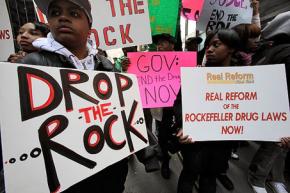A threat to Rockefeller reforms
A campaign to repeal reforms to the Rockefeller drug laws could bring misery to thousands, writes , author of 15 To Life and a communications specialist for Drug Policy Alliance.
RECENTLY, GOV. David Paterson passed legislation that brought meaningful reform of the Rockefeller drug laws in New York state. But it did not come easy. Opponents of the reforms fought tooth and nail, and swore that bringing forth these changes would open the floodgates of hell. Thank goodness common sense prevailed.
But now, district attorneys and Republican senators, who were the main opponents of the reforms, have struck back. They are seeking to mount a campaign to repeal the reforms.
For a start, they have chosen to hide behind the shield of public safety and promote their own political agenda of making those responsible for the reforms look soft on crime. But that shield gets worn out when their arguments do nothing more than undermine the recently passed reforms that advance a public-health and -safety approach to drug use and addiction.
Their argument now is centered on a provision in the recent reforms that allows judges to seal drug offenders' records. They claim that criminals will be able to hide their criminal past while applying for jobs, and that doing so would jeopardize public safety. The truth is that only people with low-level, nonviolent offenses who complete court-supervised treatment in lieu of prison are eligible to have their records sealed. The records are always available to law enforcement, and if there's a public safety threat, the judge won't seal the record in the first place.

Sealing records is nothing new. For decades, district attorneys throughout New York have had the power to seal records or dismiss cases entirely. Under current law, people who successfully complete drug court programming have their guilty pleas withdrawn and cases dismissed. This practice is widely understood as an important process for successful community reintegration.
The new law that now is being questioned by prosecutors is essentially the same--except now, judges, not prosecutors, make the decision to determine whether or not a person's record can be sealed. Prosecutors have opposed the restoration of judicial discretion on any grounds, including record sealing. This isn't surprising. They simply do not want to give up their tremendous power.
Now, the prosecutors' strategy is to use the conditional record-sealing issue to cast the Rockefeller reforms as bad policy that will make New Yorkers less safe--and also to expose weaknesses within the Senate Democrats which can be exploited in electioneering by Republicans.
But the problem is that there isn't a problem. This is about politics, not policy. Eligible individuals who complete a court-supervised drug-treatment program may petition the court to seal their record. The judge has discretion to seal the record, and the prosecutor has the opportunity to raise objections. A judge may decide not to seal the record of an eligible individual even after they complete treatment. Even though judges can seal records, the records do not disappear and are always available to law enforcement. This would give those eligible the opportunity to acquire gainful employment in order to become productive citizens.
Gabriel Sayegh, project director with the Drug Policy Alliance, said:
People re-entering the community from prison face a variety of challenges. Getting a job is a critical step to restoring their lives as responsible, tax-paying community members.
For most people, a felony record, even for a nonviolent drug offense, is a tremendous barrier to employment. Just as before, the law now allows people with low-level nonviolent drug offenses or low-level nonviolent property crimes driving by drug dependency--to petition for conditional sealing of their records. Only now, the judge, not the prosecutor, makes the final decision."
First published at the Huffington Post.


